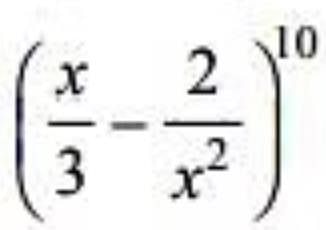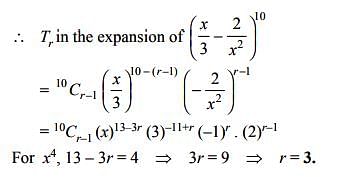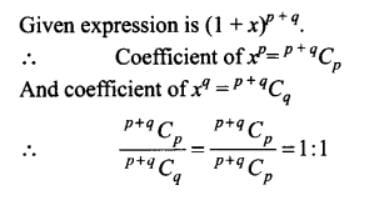Test: Binomial Theorem- 1 - Commerce MCQ
25 Questions MCQ Test Mathematics (Maths) Class 11 - Test: Binomial Theorem- 1
If n is a rational number, which is not a whole number, then the number of terms in the expansion of (1+x)n, |x| < 1, is
If n is a +ve integer, then the binomial coefficients equidistant from the beginning and the end in the expansion of (x+a)n are
| 1 Crore+ students have signed up on EduRev. Have you? Download the App |
If the rth term in the expansion of  contains x4, then r =
contains x4, then r =
 contains x4, then r =
contains x4, then r =If the coefficients of x−7 and x−8 in the expansion of  are equal then n =
are equal then n =
The largest term in the expansion of (1+x)19 when x = 1/2 is
If coefficients of three successive terms in the expansion of (x+1)n are in the ratio 1 : 3 : 5, then n is equal to
The exponent of power of x occurring in the 7th term of expansion of
The number of dissimilar terms in the expansion of (a+b)n is n + 1, therefore number of dissimilar terms in the expansion of (a+b+c)12 is
The coefficients of xp and xq (p, q are + ve integers) in the binomial expansion of (1+x)p+q are
If 2nd, 3rd and 4th terms in the expansion of (x+a)n are 240, 720 and 1080 respectively, then the value of n is
If the first three terms in the expansion of (x+a)n are 729, 7290 and 30375 respectively, then the value of n is
The two consecutive terms in the expansion of (3+2x)74, which have equal coefficients, are
The coefficient of y in the expansion of (y² + c/y)5 is
The number o subsets of a set containing n distinct elements is
The number of terms in the expansion of [(x+4y)3(x−4y)3]2 is
If three successive terms in the expansion of (1+x)n a have their coefficients in the ratio 6 : 33 : 110, then n is equal to
|
75 videos|238 docs|91 tests
|
|
75 videos|238 docs|91 tests
|































